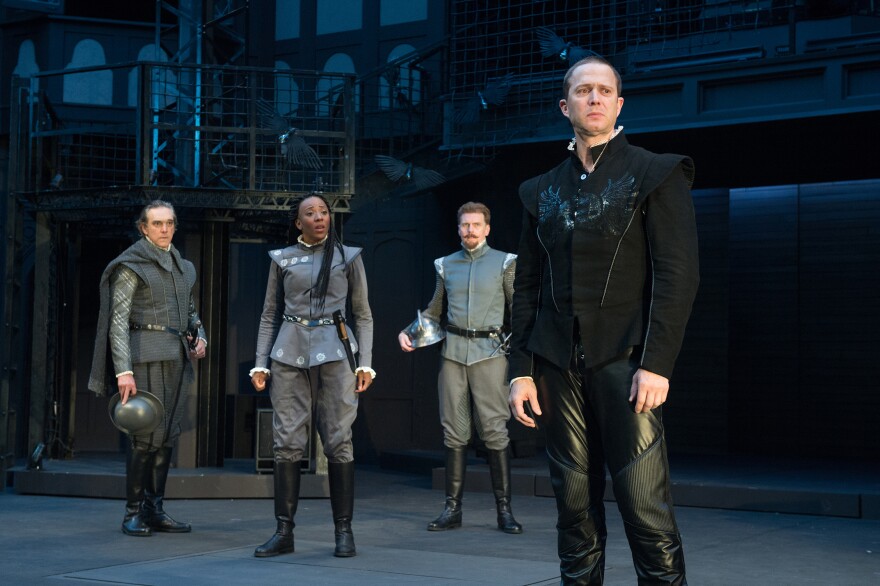As do all Shakespeare’s history plays, Richard II serves up a political lesson on the civil chaos brought on by misrule. It brings us an England consumed by an all-or-nothing game of power politics, in which victory is Pyrrhic and defeat is a capital crime. The endlessly fascinating OSF production, directed by Bill Rauch in the Thomas Theatre, transposes the action to a contemporary arena and peels ideology down to personality. It spotlights the psychological tug-of-war between two deeply flawed human beings: King Richard, the ruminating poet-thinker and his cousin, and antithesis, Henry, the extroverted fighter and strategist.
Rauch crafts an ominously silent funeral to start the play. A Mafia-inspired affair, the members of the English royal family acknowledge the death of their relative Gloucester. The faint, background rat-a-tat of an automatic weapon hints that the duke met a violent end. Immediately, Henry accuses one of Richard’s followers of orchestrating the murder, and it falls to the implicated Richard to “purge the...choler” that erupts. He fails miserably. Here Christopher Liam Moore’s man-child of a king copes with the crisis by playing with words. He speaks in rhyme, for example, and when that doesn’t impress, he throws an all-out tantrum. His melt-down reminds us of the historical fact that Richard was ten years old when fate tapped him to rule a conniving crew of noblemen. Moore gives us a king whose emotional development froze at that point as he turned inward to the intricacies of language for soothing distraction.
As the usurper Henry, Jeffrey King looms gigantic over Moore’s diminutive Richard. Moore speaks in a thin voice, his bemusement masking terror; King is brash and self- confident, his genial grin masking ambition. Moore’s wide gaze seems focused elsewhere, anywhere less threatening than the brutal space his rival dominates; meanwhile King keeps his eye on the prize, listening stone-faced to Richard’s poetic speeches, then pushing ahead with his realpolitik.
It’s clear that Richard hasn’t a chance against Henry, yet he crafts for himself a unique form of victory: preemptive capitulation. Always several verbal steps ahead of his cousin, he surrenders before the usurper can spring his trap. Richard directs his own deposing, lobs the royal orb at Henry as if to ask, “This old thing?” then plays gimme with the crown.

Richard II is propelled by the clash of two antithetical characters. In his later tragedy Hamlet, Shakespeare unites the qualities of courtier, soldier, and scholar in one highly regarded young man. Although Hamlet has reason to distrust almost everyone around him, the conflict that drives his play forward in fits and starts originates in his own mind. And that’s where director Lisa Peterson seems to locate much of the action in her extraordinary production of the tragedy running in the OSF’s Elizabethan Theatre.
The spare set features an upper stage where musician Scott Kelly presides. As the play opens, he plucks ominous chords from his electric guitar, accented by Hamlet (Danforth Comins) on his own instrument below. The music reflects Hamlet’s inner state: he is unstrung. His father, King Hamlet, is dead and his mother Gertrude has remarried his father’s brother, Claudius. And it gets worse. Amid electronic sounds that echo the Hamlet’s mental music, the ghost of his father flits on and off from every portal, but finally stays to reveal that Claudius has murdered him and to demand revenge.
Trapped between the world of the mind where his father’s ghost survives and the material world ruled by his murderous uncle, Hamlet has lost all his mirth. His description of his heavy disposition offers perhaps the most eloquent anatomy of depression in all literature, and it is underscored by costume designer David C. Woolard, whose palette ranges from black through every shade of gray. The arrival of the traveling players triggers an explosion of color, the exception that proves the rule. They bring glimpses of the old charismatic Hamlet, enthusiastic and involved, before the shock of regicide and what passed for incest shook his world.
Hamlet has a heart--we hear it beating in the soundscape when he is riled--and he thumps it with his right fist to summon courage and connection.
In the rhythm and inflection of his lines, Comins’s won’t recall any Hamlet you have seen before. Standard notions of the Prince’s procrastination and melancholy pale before the incredulity and horror that grip Comins at the moral corruption surrounding him. Fundamental laws of have been broken; lust and appetite for power have dulled empathy and encouraged random cruelty, and everyone except him is proceeding as if there’s nothing wrong. Hamlet is a whistleblower, and when his angry urgency finally registers, he gets labeled the problem.
Hamlet has a heart—we hear it beating in the soundscape when he is riled--and he thumps it with his right fist to summon courage and connection. What he sees around him is heartlessness. Thus Claudius (Michael Elich) and Gertrude (Robin Nordli) appear onstage as Hamlet perceives them: continuously posing as if for official photographs. Elich speaks in a self-consciously kingly fashion; Nordli is notably neutral. Even when Hamlet forces her to admit she betrayed his father, she does so mostly to stop him from throwing her around.
Hamlet is slow to shift his amused tolerance of Polonius to scorn. Polonius is his potential father-in-law, after all. We see what Hamlet sees: Derrick Weedon bringing an endearing specificity to the old man’s comical idiosyncrasies. Ophelia (the remarkable Jennie Greenberry) is introduced in a moment of affection but soon slips into a confusion that makes her unfathomable. Neither we nor Hamlet can understand her cooperation with his enemies. Only in the end when she goes mad does she enact her inner truth, the pathos of her untenable position, used and abused on all sides.
Molly Tinsley taught literature and creative writing at the U. S. Naval Academy for twenty years. Her latest book is a middle-grade fantasy adventure, Behind the Waterfall (www.fuzepublishing.com)




